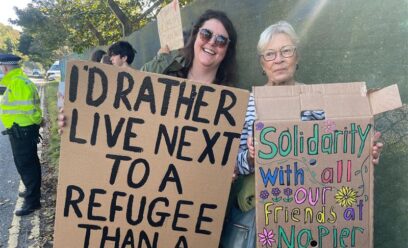Standing-up and speaking out for domestic workers and victims of abuse’
Posted by IMIX on October 19, 2022To mark Anti-slavery Day, Dareen from The Voice of Domestic Workers tells her story of surviving modern day slavery and how she came to be an active campaigner for fellow survivors.
TW/ domestic and sexual violence

Dareen: VoDW/Sounddelivery Media
By Dareen
Domestic Violence is a big issue here in the UK but I came from a country where this is seen not as a problem, but as normal family life. A woman should make sacrifices for the sake of her family.
I was an abused wife when I married my husband until we had a child. My husband was an alcoholic and irresponsible. Sometimes he would work, but most of the time he wouldn’t. Each time he was drunk, he would beat me. My whole body and face would be covered in bruises. I wanted to escape from this pain and hell but I didn’t know how or where I should start. Breaking away from my family was a great sin in the Philippines. But I couldn’t be an abused wife forever.
I only had one life and I wanted to dedicate my life to my daughter who was turning five years old at that time. The only way I could escape my husband and at the same time provide for my daughter’s needs was to work abroad.
I applied at an agency and the employer who chose me was Qatari, so I moved to Doha. But this employer sold me to another employer and he confiscated my passport and documents. Every month I was sold to different employers. I suffered different forms of abuse at the hands of these employers.
I worked very long hours, on average 22 hours a day without rest and breaks. I experienced verbal abuse, I was burned with hot water thrown at me and I never had a day off.
There was an employer who sexually harassed me. I was very scared that something terrible might happen to me
I had nowhere to go. I didn’t know anyone.
One thing was clear, domestic workers like me had no rights and no voice in Qatar. The Qatari employers treated us like they bought us and that they could do anything they wanted to do to us. This is because the Qatar and Philippines’ government allowed this to happen through the Kafala system, a legal framework defining the relationship between migrant workers and employers created to supply cheap labour and exploitative work.
The invaluable contribution of overseas Filipino workers including domestic workers, is very much visible as one of the major sources of income to keep the economy of the Philippines afloat. This country is the number one manpower exporter in the world.
While we are being hailed as ‘’Bagong Bayani’ or ‘Modern Heroes’, the reality is that we are treated by our own government not as heroes, but commodities. The remittances of overseas Filipino workers helped stabilise the economy and improve the lives of Filipinos. The overseas Filipino workers remittances in 2021 was $31.19 billion, enough to cover the national debt of the Philippines.
I had an opportunity to change my poor work situation when I was able to return to the Philippines in 2018, but the situation at home hadn’t changed. My husband started to hit me again until one leg was swollen. My salary was very low, only £250 per month which was only enough to feed my family. I couldn’t even afford to buy or rent our own house. My family continued to live with my relatives. I was forced to escape from my abusive husband again and the sight of poverty that my daughter had to endure was very painful to me.
My holiday turned to a living hell.. I was determined to give my daughter a better life and future she deserved. My three month holiday was cut short and I was forced to return to the same abusive employer. I had to survive. When I returned to Qatar, my job was to look after children ages 12, six and three-year-old twins. I was a full time nanny and housekeeper. The twins had to sleep with me and I had to go to bed at 2am but had to wake up whenever children were awake so I was working 24 hours.
In 2019 I was brought to the UK by my employer when the family went there on holiday. We landed in Scotland. For six days, I felt weak and ill because I’d had no food, no rest or even sleep. I was only given chips once a day. I thought I would die, so one day at five AM I escaped. I tried to ask for help from people because I didn’t have any money and I was in my pyjamas.
I asked how I could travel to London and people I passed showed me the way to the train station. A security man wearing a suit helped me to ride on a train bound for London even though I didn’t have money to buy a ticket. When the train stopped in York, the police came and interrogated me but released me after they found out that I was abused by my employer and had run away. I begged the police not to send me back to my employer because on my return to Qatar I would have been killed.
On board the train I searched for help, I found the Voice of Domestic Workers (VODW) on Facebook and contacted them. I told them I was arriving in Kings Cross. VODW assured me that there would be one member of the team who would be there when I arrived. And they were true to their word. I was provided with shelter, food, clothes and they also referred me to the National Referral Mechanism (NRM), a system to identify whether or not I was a victim of moderns slavery or trafficking. I was identified as a potential victim of modern slavery and trafficking, but until the final decision is reached by the NRM, I do not have any documents giving me the right to work.
The Voice of Domestic Workers has helped me to raise my awareness of the importance of our work as domestic workers and to be active in campaigning so domestic workers can have better rights. I am also one of the participants of Future Voices, a training programme to build my skills as a spokesperson and campaigner. I am standing-up and speaking out about my plight as a victim of violence that as women we shouldn’t put up with painful abuse and as domestic workers we should fight back and claim our rights as workers. I have turned all my pain into power. Never again, will I be exploited.
About the Author:
Dareen was born and raised in the Philippines. Life as a family had been very hard with no house of their own and experiencing extreme poverty. She escaped from an abusive employer and was rescued by the Voice of Domestic Workers. She is now an active member of the charity as she fights for the rights for other victims of modern slavery. She is now part of the Future Voices programme set up to create a network of migrant domestic workers as confident public speakers. Future Voices is a partnership between The Voice of Domestic Workers and charity Sounddelivery Media



